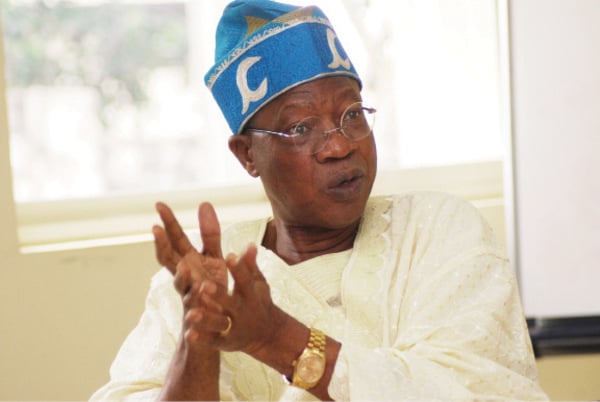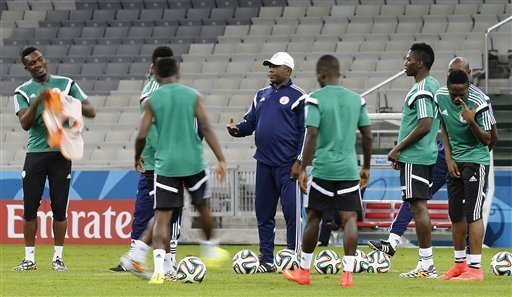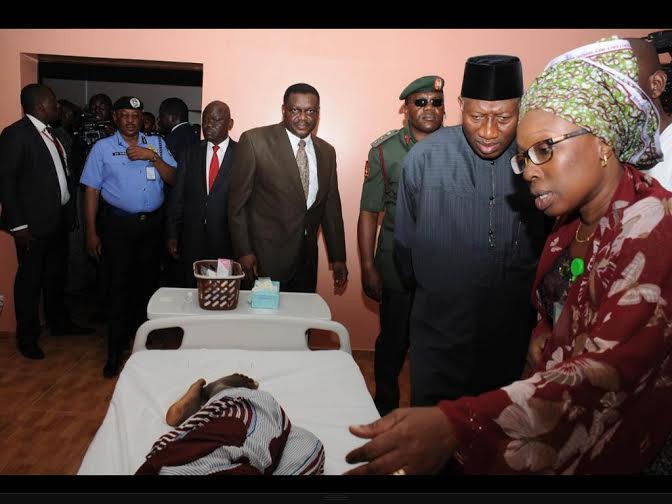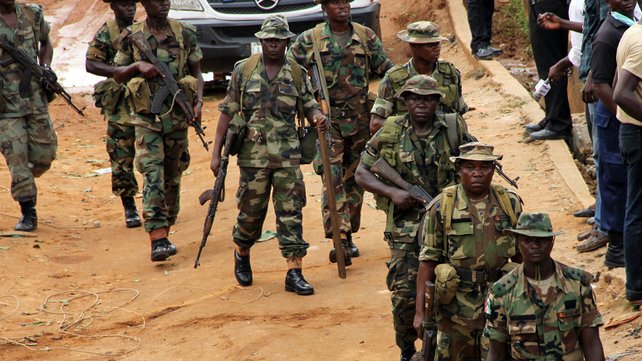What else can the 2015 elections in Nigeria be about, but the economy? The phrase, which was coined by James Carville for the Bill Clinton 1992 campaign and which played a huge role in upstaging George H. W. Clinton, could not have been more relevant in our clime than it is today.
Many Nigerians would one way or another link even the hugest monster in the room — insecurity — to the perennial mismanagement of the economy over the years. Those with an eye on the future would bellyache about the trillions (in naira) being expended today on an elusive security, depriving our children of good education or healthcare, leading to the despondency in the system, and thereby re-creating more insecurity in the land! A vicious, albeit expanding, circle of insecurity is the current reality.
So, yes, just as in 1992 USA, in 2014 and 2015 Nigeria, it’s STILL about the economy… stupid. I hesitate to add the S word lest some sensitive persons think it is an attempt to insult or ridicule. But I guess that is Yankee-speak.
In 1992, the American economy was in a slump. The first Gulf War had just been initiated with boots on ground in Iraq. The economy went into a recession (meaning GDP dropped — negative growth), the roaring 80s had just ‘roared’ past, the prosperity had departed, stock and bond markets had taken a hit. The American dream had looked like a nightmare. The Republicans seemed to have run out of ideas about what to do apart from flexing military muscle around the world. Clinton rode in with fresh ideas about the economy, including lessening the tax burden on the working class, and bingo! He won the election and served two terms, the first Democrat to so do since FD Roosevelt in the 1940s.
Advertisement
The Nigerian economy is by a far sight, in worse shape than the American economy of the early 1990s. In fact, our economy can never be compared with the American economy in terms of robustness, history, finesse, depth, breadth and pedigree. America has what people will call ‘old money’. No matter how much Nigeria sells its crude oil, our riches are still transient. The USA has invested massively, more than any other economy in the world, in human capital, in institutions, in strategy. Even China is merely trying to play catch up.
The youth of Nigeria, who make up the majority of voters, should always have this fact in mind. Itis about the economy. Everything links back to how anyone who proposes to lead Nigeria, and/or its constituent states, hopes to give and keep adding dignity to the Nigerian people. Development is dignity. And dignity is very much about the ability to live a fairly good, independent life. It is about jobs. It is about living wages. It is about peace of mind. It is about healthcare. It is about education for our children. It is about good water and affordable electricity. It is about systems and institutions that work. It is about the economy. Yes, dignity is about the economy. For, even as the holy books say, money — or whatever is the means of exchange — answers a whole lot of questions. A state of perpetual, painful need is not desirable to anyone in this world. That state (of perpetual and painful need) is where most Nigerians — especially today’s youth — find themselves.
This is why it is important to consider where we are as Nigerians today, in terms of the economy. Few Nigerians who are really privileged would say the economy is booming and growing. More (like me) would even argue that this is where the opportunities are and we should seize those opportunities. But the reality is that the cash that flows in this economy flows increasingly among a certain, shrinking concentric circle (as compared with an expanding circle of want), leaving the majority absolutely helpless, gazing at the skies, hugging religion and superstition, waiting for Godot. Sometimes, people get desperate and try to join the Joneses through any fraudulent means. Some in government, having seen this pattern over time, proceed to “dam” all the cash that should flow from their desks into the accounts of contractors and service providers, diverting such, through many ‘irrigation’ schemes, into ventures that will benefit them. Whoever is nearest to the money in Nigeria today simple gets the most benefit from it. Simple.
Advertisement
Whereas those who are in positions of leadership in today’s government would usually defer to the rosy picture, naturally, even they have been singing dirges of woe about the Nigerian economy in recent times.
One frightening example is the alarm raised by the coordinating minister for the economy, Dr. Mrs Ngozi Okonjo-Iweala, when she lamented the amounts of money that the federal government has been dispensing to the states. We should have known, but some of us were shocked to the marrow to learn that many Nigerian states earn, merely from Federal Government Allocations (called FAAC), more money in dollar terms than the entire budgets of our neighboring countries, some of which host thousands of our children as students in tertiary institutions, some of which have better public health facilities than we can boast of. The CME’s speech, given at the last convocation ceremony of Babcock University, detailed how a state like Akwa Ibom earns from the FAAC alone, without considering its own efforts at generating revenue, 4 times the budget of Liberia, while it has only a tenth the population of Liberia and a fourteenth of its landmass.
A state like Rivers earns perhaps 80% of what Akwa Ibom earns, though slightly larger in population and landmass. Even smaller states in Nigeria earn amounts that are comparable to the entire budgets of most West African countries. About eight states in Nigeria earn from the FAAC alone, an amount that is equal the entire budget of the Republic of Ghana, where thousands of Nigerians now run to for vacation, conferences, jobs, education, health, tourism, and some sanity.
The question to ask is: where does money disappear to in Nigeria? Does money have less value in Nigeria? How come we still speak of 70% poverty rate, 26% unemployment, 75% youth unemployment, homelessness, disease, filth, and despondency in spite of these amounts? Are those missing monies to be found in the maddening pace with which money is transferred illicitly out of the country, in pursuit of all sorts of assets in all sorts of countries abroad, or in the many ghost cities in our capital cities — rows upon rows of uninhabited mansions housing geckos and lizards? Many Nigerians would easily answer that, for it is obvious that the monies are simply privatized — by a collaboration of government appointees, politicians and their civilian cohorts (the few who can get access to where the koko is being shared). One is not being jealous of their ‘good fortune’, but what most other countries on the path of progress do is to ensure enough is spent, consistently and over a long period of time, on the provision of public goods — education, health, infrastructure — such that the poor may not have money but have dignity, and will thus allow the super-rich to enjoy their money. This is what is called ‘elite consensus’. That subject, no one is talking about in Nigeria. No one!
Advertisement
But just before we end up pushing all the blame to the racketeering that goes on at our state and local government levels (where even the most profligate is asking for more money to ‘blow’ like confetti — remember the pension saga?), the entire recklessness at that level could have either culminated into an incredible phenomenon at the upper echelon, or have taken its nature from what happens at the top — the Federal level. Choose one.
Now check this:
The Punch — one of Nigeria’s leading newspapers — wrote an editorial on June 9, 2014, titled ‘Reserves and Continued Profligacy’. The editors marshaled out incontrovertible comparisons between what goes on in Nigeria and similar economies. Our mainstay, crude oil, has been selling at over $100 consistently since the slight dip in 2009 (5 years!). But rather than that being a cause for cheer, Nigeria and Nigerians, the leaders and the led, have merely been complaining. The nation’s savings, called Foreign Reserves, has been dwindling. Nigeria lost $11billion 23%) of that reserve in the last one year. Our currency has been under pressure of devaluation because dwindling reserves mean we may not be able to support our import-intensive appetite in the near future. Nigeria spent $26.6billion just defending the currency in 2013 alone! The other ‘illegal’ savings that we do — the Excess Crude Account — according to the Punch, is nearly totally wiped out — from an all-time high of $23billion in 2007.
Don’t go yet! Let me grab you by your arm and tell you some more of the bad news! In contrast to Nigeria, Angola, which until recently didn’t compare with Nigeria in crude oil production, now has more money saved up than Nigeria: $38billion. Let us not talk about countries like Algeria ($192billion), war-torn Libya ($120bilion), Saudi Arabia ($733billion). The newspaper went further to inform us that as against the $1.5billion Nigeria has in its Sovereign Wealth Fund, similar oil producing countries are light years ahead — like Qatar ($170billion), Kuwait ($410billion), Algeria ($77billion) and Iran ($58.6billion).
Advertisement
So again I ask: where does money disappear to in Nigeria? Is it this “out-of-the-world” greed that has overcome the Nigerian elite and blinded them to an urgent need to reach an elite consensus and save themselves from ruin? Is it the “dams” that people have built around government revenues (FG, states and LGs) that ensure no one else but themselves and a few benefit? Are these comparisons not just mind-blowing? Can these be sustained into the future?
But let me waste no more of your precious time. For anyone who claims to have the solutions, the good news is, this is the time for the youth — the majority of voters in Nigeria — to stand up and ask the right questions, and to demand, cogent, workable, open, meaningful, honest, insightful, visionary answers. No more grandstanding and intimidation of the people.
Advertisement
I guess it will ALWAYS be about the economy…. Stupid. (ducking my head)
Fasua, an economist and financial analyst, reflects on the myriad economic issues facing Nigeria and Africa at large from different, refreshing perspectives, with a view to proffering solutions and alerting all stakeholders to their share of responsibilities during an election season.
Advertisement







